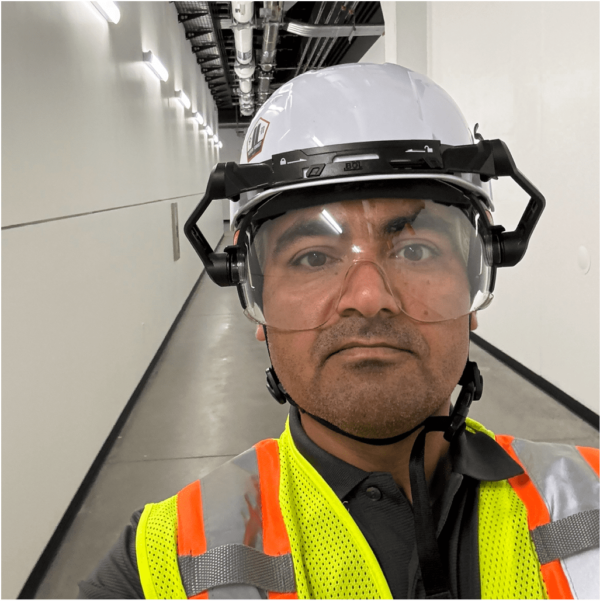
October 22, 2024 | Articles
Walking the Talk: New Vice President, Rail and Transit Gavin Martin

Investing for the future and building new and exciting delivery services are cornerstone of Hill’s successful corporate strategy. “We pride ourselves on the ability to make sound value judgements, have them ratified and then move quickly – we are an agile international business focused on sustainable growth,” said Hill’s Chief Operating Officer, Raouf Ghali. For many years, Hill’s leadership has watched UK and European markets and now feel the time was right to build on our current business footprint to create a new and exciting pan-European practice whose growth is centered on the increasing number of significant infrastructure and property-related programmes and projects coming to market. “We have taken this opportunity to invest across the European marketplace, with a variety of initiatives currently underway in the UK, Germany, Portugal, Spain, Poland, Greece, Switzerland and the CIS region. Our vision is to create a totally integrated service offering that spans our full European business; something we know our competitors have not yet managed. Increasingly our clients are becoming multi-regional and international. Hill is well placed to support their growth, and these new investments will underpin our capability to achieve our market strategy,” he said.
A key part of Hill’s European strategy is to build-out its UK business to capitalise on the ever-growing construction market (current forecasts estimate more than £100 billion, or $140 billion, to be spent over the next five years). “Working with our global clients, we have seen an increasing interest for these firms to invest in the UK and we, in turn, are investing to ensure that we capture market share. This is a great time to grow our UK business alongside their European cousins,” Ghali emphasized. The focus of this current round of investment is to capitalise on Hill’s renowned Program and Project Management service offerings, augmenting the current UK business with additional skills to help our clients successfully deliver their major projects, programs and portfolios. This additional capability will supplement an already strong local and European Hill business that is the market leader for claims and dispute consultancy, employing the largest group of construction claims professionals in the region.
“We now have a number of key wins in the UK and anticipate that there will be a significant amount of construction work coming up in the next few years in which Hill will be able to play its part,” Ghali said. His statement comes on the back drop of the UK – and Europe in general – showing positive signs of coming out of recession, following years of underinvestment in the infrastructure and property sectors. Infrastructure investment is recognised as the key driver of jobs, economic growth and UK competitiveness within the context of a globalised economy, we forecast that 2016 will be a good year for the construction industry,” said a recent report issued by the London office of KPMG. “Price pressures will start to ease and the industry should be able to start focusing on securing steady growth in what will be a strong market. It will be a year for businesses to invest in people, processes and technology and to create a platform for what could be many good years ahead.” A more stable construction industry will be able to take advantage of a strengthening market, the report also said. It went on to say that although weak profitability in the industry will not immediately improve, the expectation is still of steady growth in order books and gradually improving margins. Companies that have real specialties will be in hot demand and conditions remain ripe for consolidation in the industry, with overseas buyers continuing to take a very active position in the UK market.
Target sectors
“Key sectors for Hill within the UK market will be transport, utilities and nuclear. With High Speed 2, Crossrail 2 and, potentially, Hinckley Point Power Station all coming to market we have put our strategy in place to ensure that Hill’s brand features in their delivery” Ghali advised. To drive this growth agenda Paul Dyson has joined the business to lead the UK PM Group and EMEA region for Program Advisory services. Based out of Hill’s London office, Dyson is wearing ‘two hats’ – reporting to COO Ghali as well as to Renny Borhan, Senior Vice President and Managing Director for Europe, Middle East, Africa and Australia for the Claims Consultancy service group. For the PM business, Dyson will be involved with his counterparts in Europe helping to drive Hill’s vision for an integrated offer across the whole region. “I believe we have a unique opportunity to capture the mood of the market; our clients are looking for a more holistic and joined service offer from their supply chain partners and Hill as an agile and collaborative business partner will be able to achieve this. Our competitors operate under country silos bounded by laws and language. By collaborating closely with our European colleagues, we will be able to draw on skills, experiences and lessons learnt and transfer them across national boundaries. Hill has proven to me that this provides us with an opportunity, not a barrier. This is an exciting time in our company’s history,” Dyson said.
Dyson goes on to explain the composition of the Program Advisory practice that will evolve over 2016. “Our Program Advisory business comprises five key building blocks that underpin the inception, setup, delivery and operation of portfolios, programmes and major complex projects. These five service lines have been assembled as a direct response to market needs and, sitting together, provide for a unique business structure that responds to Hill’s corporate agile nature. The services comprise Program Leadership, Risk Advisory, Program Controls Advisory, Program Planning Advisory and Commercial Advisory,” he said. “This new structure has been designed to complement both the Claims consultancy and PM businesses by broadening our capability and extending our reach, designed to give access to opportunities at a much earlier stage of the project delivery lifecycle and also a chance to advise our clients at their corporate level to ensure they are fit and able to deliver their capital change programmes.” The UK is recognised traditionally as a very competitive and crowded market place. But Dyson’s focus will be to help Hill think creatively in order to respond to our client’s needs. This make take the form of selective partnering to provide a turnkey offer to markets that traditionally purchase highly fragmented services, or develop best-in-class tools, systems and processes to make us stand out from our competitors. A great believer in supporting the development of our service offerings to avoid stagnation, Dyson is keen to steer away from commoditised selling. “We want to be known as the go-to company that adds true value to our client’s businesses and in turn receive repeat work through strong client relationships – the true mark of a successful and enterprising business,” he noted.
Striking deeper roots in Western Europe
The UK is only the beginning of Hill’s European re-focus. Hill has major initiatives throughout Western and Eastern Europe, where it is already carrying out major projects. Western Europe offers many new opportunities in construction, particularly in the infrastructure structures in Germany, the Netherlands and Switzerland, Ghali said. “We will strengthen our position in these markets. We already have assignments in Germany and Switzerland and will very actively be pursuing opportunities in the Netherlands. In Germany, developers are investing in renovating and refurbishing commercial assets and these will be our targets,” Ghali said. Success is already in hand in Germany, said Jeffrey Sujar Blanco, Hill’s vice president in the Madrid office who is overseeing company’s operations in Western Europe. While a new project management branch office has just been formally established in Frankfurt, Hill is also working on three projects in that country that include renovation of the Blackstone MesseTurm Tower in Frankfurt, an office/commercial asset at Freidrich Strausse in Dusseldorf, and refurbishment of a hotel in Cologne to the five-star Steigenberger category. “We already have a claims office in Munich and Hamburg that have been in operation for the past 15 years,” Sujar said. Also, to further increase the footprint, new project management offices have just been opened in Frankfurt. In neighboring Poland, where Hill International retains a large team of about 100 professionals three significant projects are already in hand (two shopping centres in Warsaw and the Wood project in Wroclaw) with that count expected to grow, Sujar said. “We have been in Poland for about 15 years now and our market share is increasing there. We are planning to use the existing platform to get into the Czech Republic and Slovakia,” he said. Opportunities are also being pursued actively in Switzerland, Belgium and the Netherlands. Hill already has the contract to provide program management services for renovation of the UN Headquarters building in Geneva that focuses on 2 million square feet of office space and a conference center, said Jacques Demol, vice president of Hill International-Switzerland. “We are in the design review stage for phase 1.The next major milestone will be start of construction work in 2017,” he said.
Hill-Switzerland has also tendered for a contract to renovate the World Health Organization (WHO) headquarters building and transform temporary space to permanent offices. “The WHO anticipates a $250-million spending for the project. We have teamed up with a local partner and are hoping to hear soon about the tender outcome,” Demol said, adding Hill-Switzerland is also bidding to offer advisory PM services to the Geneva Airport Authority for its project to expand the terminal building in order to handle long-haul non-European flights at an estimated project cost of CHF 265 million ($265 million).
Entering Belgium and Holland
Plans are also in place for Hill International to get into the two new European markets of Belgium and the Netherlands. In Brussels, a final word is awaited on the Astro Tower renovation contract with an Asian investor as a client. Standing at some 107 meters, it is one of the tallest towers in Belgium built first in the late 1970s. For the Dutch market, Hill already has a small administrative office in the capital, Amsterdam, that serves as a base with plans to build on that, Demol said. “We are pursuing an opportunity with a former client that plans to develop a retail outlet in Amsterdam with a total built-up area of 75,000 square meters, 50,000 square meters of car park and 25,000 square meters of retail. There will be 100 tenants in that facility,” he said. Major opportunities for Hill in Belgium and the Netherlands lie in the commercial, retail and hospitality sectors. In Western Europe, the tradition is of the design and construction model of development and Hill’s vision will be to be active in key markets and key areas. With private equity funds being active, two elements of focus for Hill will be to understand the needs of a client and keeping an eye on financing. “The role of project managers in Western Europe is not as identified as in the U.S. and developers, engineers and contractors provide their own version of PM services making it a rather competitive market. Our strategy is to target the top of the food chain and get on board with a client at the early stages of development,” Demol said.
Eyes on Southern Europe
“We have been working in silos in our European operations and we want to begin to unify our approach. We want to leverage our local resources and experience outside of our countries of operation to grow new markets,” Ghali said. This new approach is being matched with changes in the marketplace. “European assets are attracting the interest of investors and, for the infrastructure developments, the government is looking at BOT [build-operate-transfer] or PPP [public-private-partnership] models and privatization. In Italy, Greece, and Portugal, Hill’s focus is real estate, leisure, high-speed rail and major infrastructure work. In Portugal, Hill has ongoing projects that include Ernst & Young headquarters building and the Parque Nascente shopping mall. “The Portuguese market is picking up with an appetite from international investors due to price adjustments in the real estate sector. They went through a severe recession and now things are changing,” Sujar said. The market scenario is also changing in Spain – a stronghold of Hill International’s operations in Europe – where after nearly five years of recession, the signs of a recovery are clear, Sujar said. “Our portfolio has grown over the last six to eight months with 20 new clients and our focus is on private sector international companies, as opposed to going after local investors,” he said. Besides the recent completion of the BBVA Headquarters building, Hill’s significant projects in Spain now include renovation of the Grand Hyatt and Mandarin hotels, a high-end luxury residence at Sotogrande, an office building renovation in Madrid and the healthcare sector. Under the European Strategy for 2016, a great deal of synergy is also in hand by sharing client information that require both project management and claims avoidance/consultancy services, Sujar said. “There is a change in the way we are now operating. We were country-focused, but that is changing with clients seeking framework contracts that cross geographical borders,” he said,
Contract award opportunities are also being pursued in Greece, including projects related to the privatization program that will be fundamental for stimulating the country’s economic activity going forward, said Manolis Sigalas, vice president of development management in the Athens, Greece office. To start with, part of the main pipeline of targeted work in Greece will be about $1.5 billion of private sector investments in tourism-oriented developments and infrastructure projects, he said. Notably, Hill has been supporting to date the international investors group for the Euro 700-million ($775-million) planned acquisition and re-development of Astir Palace resort in Vouliagmeni. “Astir is widely regarded as the ‘crown jewel’ resort of the Athenian coastline and the 300,000 square metre site as one of the most attractive parcels of land along the eastern Mediterranean coast. In line with our client’s vision, we are planning an environmentally friendly re-generation plan for the Astir peninsula as a whole, which respects the history of the asset and will upgrade Astir into a genuinely world-class hospitality destination. Looking at the bigger picture, the planned development will enhance Greece’s profile as an international tourism destination, but also as an investment destination, creating new jobs and benefiting the economy at the national, metropolitan and local community levels”, Sigalas emphasized. In addition, Hill is currently appointed or closely monitoring the maturity of other projects ranging from master-planned developments to major gas and transport infrastructure projects. “We believe in the country’s growth potential and the quality of its workforce”, adding that “uninterrupted political and social commitment to attract and drive investments forward being key for ‘making it or breaking it’ at this stage”. From a service perspective, Hill sees great opportunity to provide upstream development support and advisory services throughout continental Europe. “Positioning Hill close to funding source creates opportunities to engage with a client upstream in the project delivery process and realizing project management opportunities downstream. Experience has shown that it can be our ‘Trojan Horse’ for breaking into and solidifying operational presence in markets that have been difficult to penetrate for providing core type project management services” Sigalas said.
The upstream advisory service has three pillars to it, as Sigalas pointed out, and they are: early-stage development support and advisory services for advancing a project’s maturity; technical advisory services in the context of merger and acquisition transactions; technical assistance with donor-funded projects. Hence, Hill’s strategy is targeted at both private and public sector investments that is set to rise in the coming few years, explained Sigalas. Indicatively, in excess of Euro 25 billion ($27 billion) of new private equity funds have been raised recently by only a few private equity firms targeting European real estate investments. Furthermore, Sigalas noted that “ The European Commission has also put the final building blocks under its European Fund for Strategic Investments with about Euro 300 billion ($310 billion) of public and private money expected to be mobilized over the next three years.” A large part of this program will relate to investments in the transport, energy and environment sectors.
Eastern Europe
Hill’s reputation of being a global company and working with multiple clients globally has been recognized with the company breaking into private development in Eastern Europe including the Euro 3.2-billion ($3.3-billion) Belgrade Waterfront project in Serbia. “We have a cost management and QS contract from the client, Eagle Hills, and are hopeful of additional contracts with the development of other plots that will include construction supervision services,” said Nikolaos Koumpis, senior projects and contracts manager with Hill in Athens. Furthermore, Hill is also carrying out due diligence and will be providing PM services for a hotel development in Serbia on behalf of a private investor group. On the public development front, “Hill is carrying out TA services on behalf of EU delegation for the judicial buildings in Serbia; additionally, the company is to participate in a tender to provide construction management services for what is being labeled as the biggest clinical center in Belgrade to be developed under a European Investment Bank loan”, Koumpis said. In Romania, Hill is active on a vast number of PM and TA services for public and private financing institutions; in Bosnia and Herzegovina, FYROM, Albania, and Kosovo, “providing project management and construction supervision services is also on Hill’s radar”, Koumpis said. “In fact, we intend to participate in the tenders for rehabilitation and expansion of the existing hospitals in Albania and FYROM that are being funded by a number of Member State International financial institutions,” he said. And last, but not least, he said, Hill International will soon be submitting a proposal to the U.S. Army Corps of Engineers for its ID/IQ contracts in the Balkan region. Hill’s target list also includes focusing on U.S. financing programs in the Balkans.
Turkey and CIS
Turkey has been predominantly a public sector market, but are now looking at the private sector, Ghali said. With a current inventory of 198 PPP projects – of which 164 are already in operation, with another 34 under construction – the EU nation has been successful in enticing the interest of the private sector, Yilmaz Ilgin, director general at the Ministry of Investment, said late 2015 at the 4th Annual PPP in Turkey forum in Ankara. “Private and public sector investments will be addressed with a holistic approach for achieving high and stable growth performance,” he said, noting public investments will be focused on economic and social infrastructure areas that could not be fulfilled by the private sector. “In the infrastructure sector, emphasis will be on better maintenance and repair and efficient use of existing assets,”Ghali said. PPP is an alternative system used by public administrators to provide service to its citizens where non-core functions are transferred to the private sector, according to Serdar Gucar, senior vice president and managing director of Turkey for Hill. While the company has yet to win any PPP projects in Turkey, Hill is continuing its efforts to win more projects in the region as the CIS states are opening themselves to embrace Western styles of project and construction management, in light of new foreign direct investments. Maintaining flexibility under the low oil and understanding local business rules will be crucial to winning new contracts in that region, commented Gucar. Doing business in CIS nations is similar to China, Latin America and the Middle East. It is not just about knowing the right people, but also respecting and understanding the local cultures and ethics that will open up doors and generate business, he said.
His statements come at a time when Hill is bidding for major infrastructure, educational, healthcare, tourism, hospitality and real estate projects in Kazakhstan and Georgia. “In Kazakhstan where Hill has ongoing contracts, the construction rules are different from the rest of the world. Earlier it was the Russian codes, but they are now willing to embrace the Western style and standards. Our strategy for the CIS states will be to expand in two directions– industrial projects and real estate ventures–and we will be bidding for the new projects to be tendered,” Gucar said. Turkey and Kazakhstan signed bilateral deals in February 2015 for construction of the Khazar University techno-park in Astana which will serve as a business and technology center in the heart of Kazakhstan. Also, Kazakhstan is looking at investments in the healthcare and education sectors, including an expansion of the Nazarbayev University and providing it with an international status to attract students globally, he said. Last, but not least, China is also considering investing in a free zone in Kazakhstan. All these projects are opportunities for the company as clients now realize the benefits of employing a project and construction manager like Hill, Gucar pointed out.
As Hill celebrates its 40th year in 2016, Europe is firmly on the company’s radar as an area of re-focus and re-engagement with the prime driver being major investments planned by the private sector and financial institutions. While the existing staff members in Europe will continue to play a major role in helping Hill International win new contracts, ample opportunities will also be opened up for Hill’s European employees to return home after we succeed in winning new jobs, Ghali said. The Europe 2016 Strategy, comes on the back of the company having established firm roots in the Middle East and its home turf of the U.S. while also pursuing opportunities in Asia Pacific and Latin America.
By Ashok Dutta
Share

October 22, 2024 | Articles
Walking the Talk: New Vice President, Rail and Transit Gavin Martin

October 18, 2024 | Articles
Future-Proofing Projects: Janakiram VVS Talks India’s Digital Transformation

October 14, 2024 | Articles
Weathering the Storms Part 3: Resiliency Support for Investor-Owned Utilities

October 12, 2024 | Articles
Growing Greener Healthcare: The SNF Global Health Initiative

October 9, 2024 | Articles

October 7, 2024 | Articles
Weathering the Storms Part 2: Leveraging Public Funding for Utility Resiliency

September 30, 2024 | Articles

September 23, 2024 | Articles
Independent Safety Assessments for Rail Projects: Weighing Benefits and Challenges

September 19, 2024 | Articles
Hill Shares Industry Insights to Help Ukrainian Contractors Rebuild

September 19, 2024 | Articles